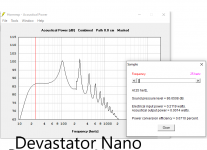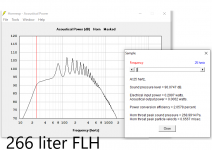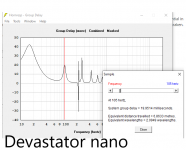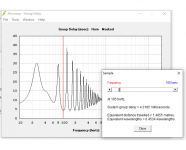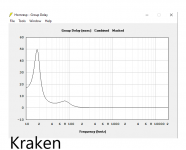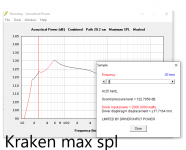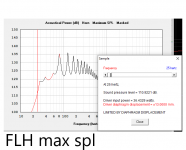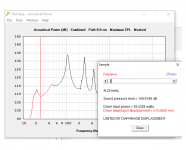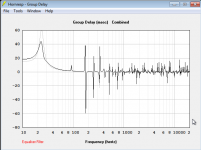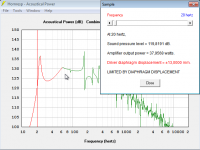I've got my relative interesting in building a diy sub. I am lucky to have a spare Eminence lab12c so I'm thinking of using that to it's full potential in a Devastator nano or a FLH (front loaded horn).
What would you guys build? I'm looking into these two horns options mainly but my relative also said what about 21" dayton kraken. Budget is around $500. Graphs below are the subs at 2 volts.
What would you guys build? I'm looking into these two horns options mainly but my relative also said what about 21" dayton kraken. Budget is around $500. Graphs below are the subs at 2 volts.
Attachments
I've built some horns before that were similar to the autotuba and I really like the upper bass impact I get from them. Never really heard a taiko drum so clear. So I'm hoping for something similar with the FLH (front loaded horn) and eminence 12lab except with a little more low end. The FLH has some bad peaks in the group delay and the 20ms of group delay at 100hz with the devastator doesn't look good either. Below is group delay for the three options.
Attachments
I did help to make an MLTL sub 2 years ago for this driver, this is a massive (205cm high, 40cm wide and 55cm deep) tower, but can bring the sub easely to 25Hz on full power (115dB) without going into overexcursion or compression. I did not design it, but did help the assembly of the wood (21mm birch ply panels precut on cnc machine) and electronics and finish. It has a big ammount of stuffing inside over the full length. I do know the devastator, but this is better as sub below 80Hz, and especially in the low sub region (40-25Hz) where the devastator lacks.
These (we made 2) are used in a big private movie theater now behind the screen. the satelites are not diy, the owner uses rebuild Altec 612 cabinets with GPA 604H drivers for it.
These (we made 2) are used in a big private movie theater now behind the screen. the satelites are not diy, the owner uses rebuild Altec 612 cabinets with GPA 604H drivers for it.
Thanks waxx, do you have a hornresp model of your MLTL?
No, because it’s not mine. I did a part of the building for the owner who paid me for it. The design and cnc cutting were done by someone else. I did only the assmbly and finishing. And i helped to install it in the theater. And i don’t use hornresp.

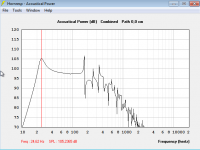
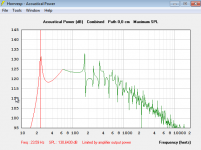
A simple unstuffed MLTL roughly based on the dimensions stated by "vaxx".
Quite capable. I would guess some slight stuffing could damp out a lot of the out of band ripples seen in this simulation. Hornresp always exaggerate out of band ripple, so I don`t think it is very important for sub duty.
The low Q peak around Fb is easy to EQ with some DSP, and should not pose any problems. It will be somewhat damped by stuffing too.
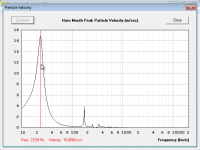
The 360 cm2 port cross section area might seem excessive, but it is large to keep port compression and turbulence low at high power levels.
120 watts will give 121 dB output at 24 Hz, and the port velocity is quite high at around 17 m/s. More then I like, but I would guess it will compress less then most BRs, since a quarter wave resonator behaves quite differently compared to a BR at high power levels.
You are worried about group delay at 20hz ?
Group delay below 30hz is fine to my ears.
Look at that deep flat response compared to the peaking in all those other designs.
Group delay below 30hz is fine to my ears.
Look at that deep flat response compared to the peaking in all those other designs.
I agree Norman, I can't tell the difference in group delay when I did some low tunings 20hz vented compared to sealed. 31hz tuning I could distinguish however.
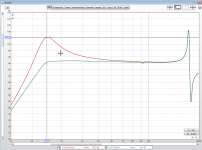

The same MLTL that I simulated yesterday. I just updated the EQ filter setting to a single -8 dB @ 24 Hz with a Q = 2.0.
I think this is a better EQ, in simulation at least.
It is a very luxurious situation to get the opportunity to EQ down the lower part of the passband 8 dB to get a flat simulated response. It only takes 120 watts to reach 121 dB @ 25 Hz in 1.0 Pi without room gain. And this is likely 121 dB with very little compression from ports etc.
36 ms GD at 24 Hz is quite an achievement (which I can state since this is not really my design in any way - I just tried my best to coax forward a MLTL design based on "vaxx" stated measurements).
The ripple at 92 Hz does disturb me, since my experience is that it will be quite noticable. But I guess this mostly goes away with some stuffing of the pipe.
- Home
- Loudspeakers
- Subwoofers
- What DIY sub would you build? Devastator nano, Front Loaded Horn? Kraken?
